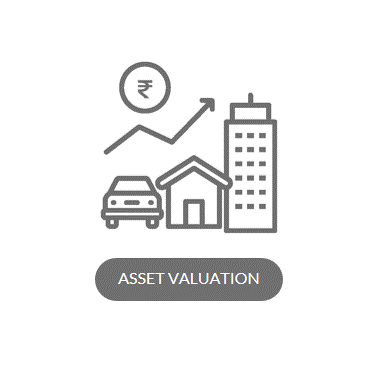ValuationGet a Competitive Edge with Our Comprehensive Valuation Services Empower Your Business with Our Unbiased and Independent Valuation Services
Expert Valuations for Informed Decisions
AboutUnleash Your Business's Full Potential with Our Precise and Thorough Valuation Services
Make informed business decisions with accurate and reliable valuation services from Kantilal Patel & Co. As one of the dynamic Indian Chartered Accountants and CA firms in India, we provide comprehensive valuation services that cater to the unique needs of your business. Our team of experienced and knowledgeable valuation experts uses a range of techniques and methodologies to determine the true worth of your business and assets.

Business Valuation
A detailed examination of your company’s financial statements, market trends, and industry comparable to determine the true value of your business. We also consider qualitative factors such as management strength, customer relationships, and intellectual property.
Asset Valuation
Guidance in determining the value of your company’s assets, including tangible assets such as property, plant, and equipment, as well as intangible assets such as patents, trademarks, and copyrights. Our experts use a variety of methods such as the cost approach, market approach, and income approach to determine the value of your assets.


Due Diligence
A comprehensive due diligence process to identify any potential risks or concerns that could impact the value of your business or assets. Our team of experts will review your financial statements, legal documents, and operational processes to ensure that your business is fully compliant and that there are no hidden liabilities.
Trigger points of Valuation
Following are some information about what event triggers valuation and when it needs to be done:
| Valuation under The Companies Act, 2013 | |||
| Sr No | Event (What) | Legislature | Time limit (When) |
| 1 | Valuation of assets of a Section 8 Company when it is to be converted into any other type of company | Section 8 read with Rule 21 and 22 of the Companies (Incorporation) Rules, 2014 | Before filing for such conversion |
| 2 | Issue of shares for consideration other than cash – requirement for valuation of the consideration | Section 39 read with Rule 12(5) of the Companies (Prospectus and Allotment of Securities) Rules, 2014 | When filing the return of allotment for issue of shares for consideration other than cash |
| 3 | Fair price justification for issue of sweat equity shares | Section 54 read with Rule 8(6) of the Companies (Share Capital) Rules, 2014 | Before the approval of issue of sweat equity shares |
| 4 | Valuation of IP / know how acquired by issue of sweat equity shares to be valued | Section 54 read with Rule 8(7) of the Companies (Share Capital) Rules, 2014 | Before the approval of issue of sweat equity shares |
| 5 | Share issue (other than rights and ESOP) | Section 62(1)(c) read with Rule 13(1) of the Companies (Share Capital and Debentures) Rules, 2014 | Before pricing the issue |
| 6 | Determination of price of issue by an unlisted entity when shares are issued to employees /Trust to which the company is providing loan for such purchase | Section 67(3) read with Rule 16(1)(c) of the Companies (Share Capital and Debentures) Rules, 2014 | Before the approval of the transaction |
| 7 | To determine that bonds / debentures issued are secured (And hence not a deposit), valuation of the assets provided as security | Section 73 read with Rule 2(ix) of the Companies (Acceptance of Deposits) Rules, 2014 | Before the issue of such bonds / debentures |
| 8 | Before the issue of such bonds / debentures | Section 192(2) | Before effecting approval for the transaction to be executed. |
| 9 | Filing of a compromise or arrangement amongst creditors / shareholders | Section 230(2) and Section 230(3) | Before filing of the application. |
| 10 | Mergers and amalgamations | Section 232 | When Board places their report to the members |
| 11 | Acquisition of minority stake by those holding 90% or more | Section 236 | Before making an offer for buyout of the shares from the minority holders |
| 12 | Valuation of assets at the time of winding up of a company | Section 281(1)(a) | Once the liquidator is appointed |
|
Valuation under The Insolvency and Bankruptcy Code, 2016 |
|||
|
Sr No |
Event (What) |
Legislature |
Time limit (When) |
|
1 |
Valuation by two registered valuers to be appointed by the RP |
Regulation 27 read with Regulation 35 of the IBBI (Insolvency Resolution Process for Corporate Persons) Regulations, 2016 |
Once the company is placed into CIRP |
|
2 |
A third valuer’s valuation when the RP is not satisfied with the two valuation reports and where the variance between these values is significant |
Regulation 27 read with Regulation 35 of the IBBI (Insolvency Resolution Process for Corporate Persons) Regulations, 2016 |
If the RP determines this is required after the first two valuer’s reports are received by him |
|
3 |
Valuation of assets when a company is placed under liquidation, if the liquidator decides that the valuation at the time of CIRP may no longer be relevant |
Regulation 35 of IBBI (Liquidation Process) Regulations, 2016 |
When the Liquidator makes such an assessment once the liquidator is appointed |
|
4 |
Valuation of assets of a company going in for voluntary liquidation |
Section 59(3)(b)(ii) of IBC, 2016 and Regulation 3 of IBBI (Voluntary Liquidation Process) Regulations, 2017 |
Once the company has resolved to place the company into voluntary liquidation |
|
5 |
Valuation of the undervalued Transactions |
Section 46 (2) |
When the RP has identified undervalued transactions and there is a need for valuation thereof |
|
6 |
Ascertainment of Fair value and liquidation value of the Assets of the Corporate Debtor |
Regulation 26 read with Regulation 34 of the IBBI (Fast Track Insolvency Resolution Process for Corporate Persons) Regulations, 2017 |
Once the FastTrack insolvency process commences |
| Valuation under the Securities and Exchange Board of India (SEBI) Regulations | ||||
| Sr No | Event (What) | Law | Legislature | Time limit (When) |
| 1 | Quarterly |
Securities and Exchange Board of India (Listing Obligations and Disclosure Requirement) Regulations, 2015 |
Regulation 87C –Valuation, Rating and NAV disclosure |
For NAV in case of an issuer whose security receipts are listed on a stock exchange |
| 2 | Direct acquisition effected under SEBI Takeover Code – in determining the offer price, one of the criteria when the shares are not frequently traded |
Securities and Exchange Board of India (Substantial Acquisition of Shares and Takeovers) Regulations, 2011 |
Regulation 8 (16) – Offer Price |
At the time of open offer where the direct acquisition is of an entity where shares are not frequently traded |
| 3 |
Preferential issue – conversion of debt into equity under strategic debt restructuring scheme |
SEBI (Issue of Capital and Disclosure Requirements) Regulations, 2018 |
Regulation 158(6)- Preferential Issue |
At the time of determination of conversion price in case of conversion of debt into equity under strategic debt restructuring scheme |
| 4 | In case of issuance of specified securities on a preferential basis for consideration other than cash |
SEBI (Issue of Capital and Disclosure Requirements) Regulations, 2018 |
Regulation 163(3)- Disclosures to Shareholders |
At the time of issuance of specified securities on a preferential basis for consideration other than cash. |
| 5 | Pricing of the infrequently traded shares |
SEBI (Issue of Capital and Disclosure Requirements) Regulations, 2018 |
Regulation 165- Pricing of Infrequently Traded Share |
At the time of pricing of shares of an issuer which are not frequently traded in line with the requirements of Regulation 165 of the SEBI (ICDR) Regulations, 2018 |
| 6 | Annually |
Securities and Exchange Board of India (Infrastructure Investment Trusts) Regulations, 2014 |
Regulation 21 (4) – Valuation of Assets |
For NAV publication within 2 months of year end |
| 7 | Half yearly |
Securities and Exchange Board of India (Infrastructure Investment Trusts) Regulations, 2014 |
Regulation 21 (5) – Valuation of Assets |
For NAV publication within one month of half year end |
| 8 | For purchase of any project |
Securities and Exchange Board of India (Infrastructure Investment Trusts) Regulations, 2014 |
Regulation 21 (8) – Valuation of Assets |
At the time of transaction |
| 9 | For sale of any project |
Securities and Exchange Board of India (Infrastructure Investment Trusts) Regulations, 2014 |
Regulation 21 (8) – Valuation of Assets |
At the time of transaction |
| 10 | When public issue is proposed (except bonus issue) |
Securities and Exchange Board of India (Infrastructure Investment Trusts) Regulations, 2014 |
Regulation 21 (7) – Valuation of Assets |
When the issue is proposed to be made |
| 11 | Annually |
Securities and Exchange Board of India (Real Estate Investment Trusts) Regulations, 2014 |
Regulation 21 (4) – Valuation of Assets |
For NAV publication within 3 months of year end |
| 12 | Half yearly |
Securities and Exchange Board of India (Real Estate Investment Trusts) Regulations, 2014 |
Regulation 21 (5) – Valuation of Assets |
For NAV publication within forty- five days from the date of end of such half year. |
| 13 | For purchase of any project |
Securities and Exchange Board of India (Real Estate Investment Trusts) Regulations, 2014 |
Regulation 21 (8) – Valuation of Assets |
At the time of transaction |
| 14 | For sale of any project |
Securities and Exchange Board of India (Real Estate Investment Trusts) Regulations, 2014 |
Regulation 21 (8) – Valuation of Assets |
At the time of transaction |
| 15 | When public issue is proposed (except bonus issue) |
Securities and Exchange Board of India (Real Estate Investment Trusts) Regulations, 2014 |
Regulation 21 (7) – Valuation of Assets |
When the issue is proposed to be made |
| 16 | Half yearly |
Securities and Exchange Board of India (Alternative Investment Funds) Regulations, 2012 |
Regulation 23 – Valuation |
In case of investments of Category I and Category II Alternative Investment Funds |
| 17 |
Determination of fair value of the delisted equity shares, in case where equity shares are delisted by a recognized stock exchange |
Securities and Exchange Board of India (Delisting of Equity Shares) Regulations, 2021 |
Regulation 33 – Delisting of equity shares of a company by a recognised stock exchange |
At the time of delisting of equity shares of a company by a stock exchange |
| 18 |
Valuation of the know-how or intellectual property rights or value addition |
Securities and Exchange Board of India (Share Based Employee Benefits and Sweat Equity) Regulations, 2021 |
Regulation 34 – Valuation |
Before the approval of issue of sweat equity shares, valuation of the know- how or intellectual property rights or value addition has to be done |
KPC Edge
- Expertise:
Our team of experts has the knowledge and experience to provide you with the insights you need to succeed. - Customized Solutions:
We work with you to understand your business needs and provide you with a customized service that meets your specific requirements. - Quality:
We use the latest technology and software to ensure that our results are accurate and reliable. We are committed to providing you with a high-quality service that is tailored to your business needs. - Timely Delivery:
We understand that time is of the essence when it comes to valuation services. Our team is dedicated to completing your services accurately and on time.
Registered Valuer
We adhere to strict ethical standards and follow established methodologies, ensuring that their valuation reports are unbiased, objective, and compliant with applicable regulations and standards.
Learn more
Business Valuation
We offer business valuation services that involve a comprehensive analysis of a company’s financial health and future potential. Our team of experts uses various valuation methods to determine the economic value of a business. We take into account the current market conditions, financial trends, and other relevant factors to provide our clients with an accurate and realistic estimate of a company’s worth.
Learn more
Purchase Price Allocations for M&A
PPA involves valuing the assets and liabilities acquired, such as property, equipment, intellectual property, inventory, accounts receivable, and goodwill. The allocation of the purchase price to these assets and liabilities has significant implications for financial reporting, including the calculation of goodwill and the determination of the book value of the assets on the acquirer’s balance sheet.
Learn more
Valuation for Intangible Assets
We understand that intangible assets can be some of the most valuable assets a company possesses, and that properly valuing these assets is crucial for making informed business decisions. This page will provide you with a comprehensive overview of what intangible assets are, why they are important, and how we approach valuing them.
Learn more
Fair Valuation for Financial Reporting Purposes
Fair valuation for financial reporting purposes is critical to ensure that financial statements are transparent and reliable. At Kantilal Patel & Co, we specialize in providing accurate and reliable valuations that comply with Ind AS requirements.
Learn more
Valuation of ESOPs
Companies are constantly looking for ways to attract and retain the best talent. Offering employees an ownership stake in the company through ESOPs can be an effective way to achieve this goal. However, it is important to understand the valuation process to ensure that the company and its employees are both getting a fair deal.
Learn more
Valuation for Transfer Pricing
Companies often need to transfer goods and services between related parties across different countries, which can lead to tax implications. Our valuation for transfer pricing service helps businesses ensure that their transfer pricing is in compliance with regulatory requirements while minimizing the tax impact.
Learn more
Valuation for Dispute Resolution
We have worked with a wide range of clients, from individuals and small businesses to large corporations and listed entities, providing valuation services that meet the highest standards of professionalism and accuracy. We provide customised approach as we know that every business has its unique needs.
Learn more



